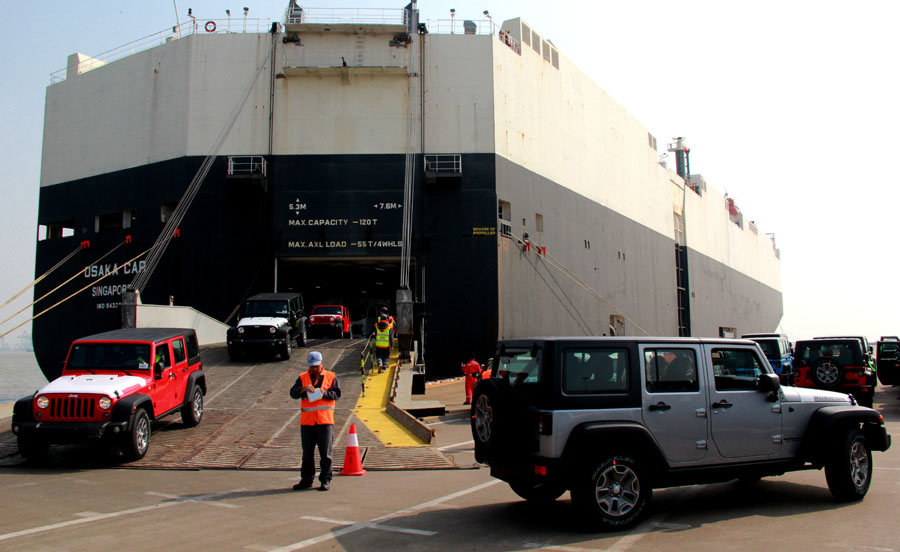US ports in line to suffer from tariffs


The seaport in Houston Texas, handles the most imported steel of any port in the United States-3.7 million metric tons last year. And that has Executive Director Roger Guenther worried.
"As a result, we are concerned that the 25 percent tariff on steel cargo could decrease cargo volumes, creating a detrimental impact on local jobs and the economy, he said.
Guenther isn't alone with his concern about US President Donald Trump's tariffs o 25 percent on imported steel and 10 percent on aluminum that were imposed last month.
Domestic US steel manufacturers say the tariffs will allow them to create some jobs, but many ports rely on the imported steel that is subject to the tariffs.
Steel is an important cargo at ports along the coast of the Gulf of Mexico, as well as on the West and East coasts and in the Great Lakes region. In addition to Houston, the top steel gateways include Mobile, Alabama; New Orleans, Louisiana; Brownsville, Texas; several ports in the Pacific Northwest and Great Lakes region; and on the Delaware River.
"The ports are on the front line if some sort of trade war develops," Kurt Krummenacker, a Moody's senior vice-president and manager, told The Bond Buyer in March.
He said the Gulf ports that have the largest share of steel and aluminum imports and are heavily into oil refining-including Houston, Mobile and New Orleans-are probably the most affected.
"If there is retaliation from trading partners, the risk could spread to other ports," he said.
Jimmy Lyons, CEO of the Alabama State Port Authority, said, "My greatest fear all along has been that an action like this could lead to retaliation that could affect our exports. I'm afraid that's where it could lead us. In a trade war, there are no winners."
Mobile handles about 5 million tons of steel annually, including about 3 million tons of imported slab steel, and 250,000 tons of lighter aluminum.
The Port of New Orleans is third in the nation for steel imports, behind Houston and Mobile, its spokesman Donnell Jackson said.
In 2017, the port handled 2.48 million tons of imported steel, accounting for 83 percent of its bulk tonnage and 30 percent of its total general cargo. The port took in 665,154 tons of aluminum traded on the London Metals Exchange in fiscal 2017.
Robert M. Landry, vice-president and chief commercial officer of the port, told a Commerce Department hearing in May that about 80 percent of New Orleans' steel imports are moved up the Mississippi River on barges, which are then used by US farmers to deliver agriculture products to grain elevators on the Lower Mississippi River for export. Sixty percent of US soybean exports move through Lower Mississippi grain elevators, chiefly in the Port of South Louisiana between New Orleans and Baton Rouge.
"Without those barges moving upriver, the cost to transport US grain increases, making US agricultural products less competitive with those in other producing countries like Brazil and Russia," he said.
Brandy Christian, president and CEO of the Port of Louisiana, said that imposing tariffs arbitrarily on steel and aluminum will hurt ports, the larger maritime community and steel-consuming industries.
In 2003, the port's steel imports fell 46 percent after President George W. Bush slapped tariffs on various imported steel products from a limited list of countries under Section 201 of the Trade Act of 1974, she said.
Christian said the port "supports the enforcement of all trade agreements, but an across-the-board action fails to recognize those countries playing by the rules".
She said that any retaliation by other countries against US exports is a concern for the Port of New Orleans and ports along the lower Mississippi.
"Louisiana is a leader in exporting the nation's agricultural products overseas, with a nearly 60 percent market share of export grain from the US Midwest," Christian said.
The jobs of dockworkers, as well as port revenue, will be affected by the steel and aluminum tariffs, said economist Loren Scott, emeritus professor at Louisiana State University.
A trade war could undo any benefits gained from Trump's recent tax reforms and industrial deregulation, Scott said. "Bottom line, unless you're in steel or aluminum, these tariffs are very bad economic policy. You can't put lipstick on a pig." After the California ports of Los Angeles and Long Beach, the largest importer of steel products on the West Coast, is the Port of Vancouver, Washington. In 2017, the port unloaded 712,834 tons of steel.
Steel imports support 600 jobs at the port and account for 36 percent of its annual revenue, according to port executives. Most of Vancouver's steel imports come in from Russia and Mexico, with some from South Korea and Japan.
"The main concern around a lot of this talk" about tariffs has to do with China, said Ryan Hart, spokesman for the Port of Vancouver, told The Daily News in Longview, Washington. "And we don't import steel from China; it comes from these other countries" that could be unfairly targeted by broad tariffs.
More than 50 percent of the containers on ships leaving Puget Sound go to China, according to the Port of Seattle.
China is Washington's No 1 export market-$18 billion worth of business last year.
"Our jobs in advanced manufacturing, in aviation, in technology, in agriculture, are creating export products for sale, and China is our largest market," said Andrew Wilson, the Washington State China Relations Council chairman. "When China puts quotas and tariffs on those products, those products won't ship. Those jobs in fact will be stagnated or lost."
Courtney Gregoire, Port of Seattle commission president and co-chair of the Northwest Seaports Alliance, representing Seattle and Tacoma, said "higher tariffs will jeopardize jobs in Washington and raise costs for consumers in a much wider range of industries".
As for the twin ports of Los Angeles and Long Beach, they saw an increase in traffic this year, Gaurav Purohit, a Moody's analyst, told the Bond Buyer. But he said steel represents less than 2 percent of the revenues at those ports, so less impact is anticipated from the steel tariffs.




































